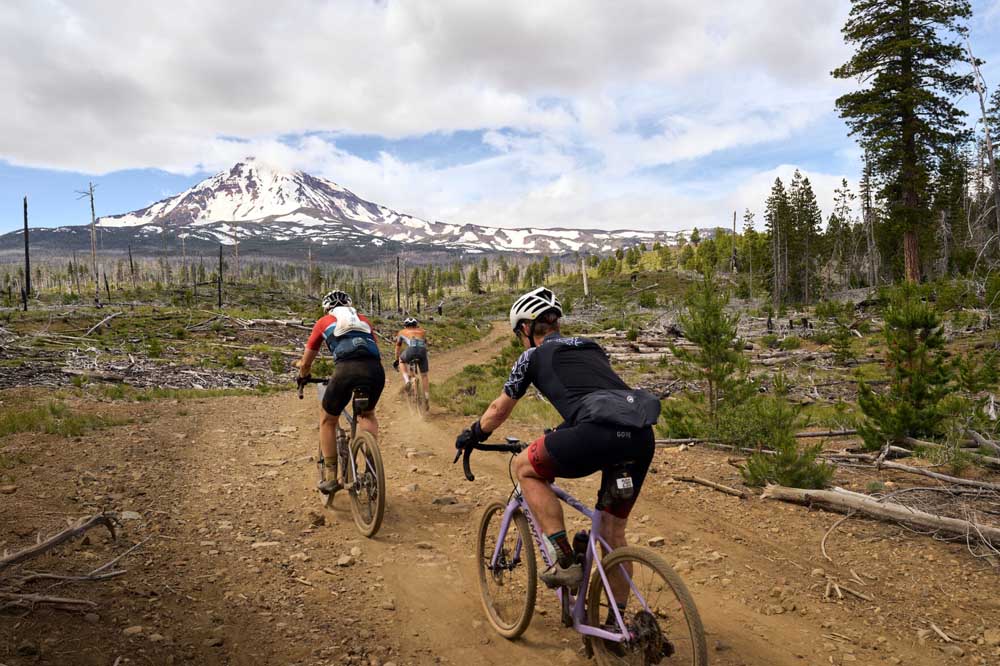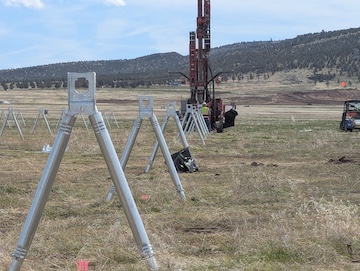‘Miracle performance’: Bend’s Serena Bishop Gordon is 2nd in Oregon Trail Gravel Grinder
Published 9:30 am Wednesday, July 3, 2024

- Men's racers compete in the Oregon Trail Gravel Grinder with North Sister in the background.
The Oregon Trail Gravel Grinder started in 2019 and the Central Oregon race has quickly grown to become perhaps the most competitive gravel cycling event on the West Coast.
One Bend cyclist is not afraid of the international competition that the race now draws. Serena Bishop Gordon surged from as far back as seventh place to finish second overall in the pro women’s race after an incredible fifth-and-final stage on Sunday.
“I would say it’s the crown jewel of gravel races in the United States,” said Bishop Gordon, 45, who also finished second in 2019 and 2021. “There’s no other gravel race that is point-to-point. Five days of epic riding. And every course is so different and unique, just because of the different terrain and ecosystems you go through. I would say this is one of the highlights of gravel racing in the country.”
The five-day gravel cycling race included about 400 riders pedaling some 350 miles with more than 30,000 feet of climbing. Bishop Gordon’s overall time was 18 hours, 7 minutes, 18 seconds. Cecile Lejeune, of Tucson, Ariz., by way of France won the women’s race in 17:35:54, and Flavia Oliveira Parks, of Pleasanton, Calif., was third in 18:09.23.
The race started June 26 and ran through Sunday on gravel and dirt roads throughout the Central Oregon Cascade Range. The race was fully supported, as riders were set up with camping tents, gourmet food, etc. each night.
“I’ve got to say, Serena’s performance was like a miracle performance,” said Oregon Trail race director Chad Sperry. “She rode out of her mind. She beat some of the best in the WORLD in the women’s gravel field. Her performance to climb back to second place after being in seventh against the depth of this field is just astronomical. I am just blown away by what she accomplished on that final day.”
Sperry is the former race director of the now defunct Cascade Cycling Classic road stage race, an event that was held for 39 years in Central Oregon but has not been staged since 2019. (The one-day Cascade Cycling Classic Criterium is returning to Bend on Aug. 10.) Sperry switched to producing gravel races to avoid the stress and complications of road stage races.
Sperry said the Oregon Trail has supplanted the Cascade Cycling Classic as the most prestigious cycling race in Oregon, noting that the Oregon Trail has the deepest pro field on the entire West Coast.
“To be honest with you, we’re actually getting more European and foreign riders than what Cascade did,” Sperry said. “Cascade was big on the U.S. circuit, but Oregon Trail is now global. The winners of the men’s and women’s race were both from France, so that gives you an idea of the global reach we have.”
Oregon Trail stages
The challenge of the Oregon Trail race is evident by simply looking at the itinerary:
Day 1: Bend to Gilchrist (66 miles, 3,336 feet of climbing)
Day 2: Gilchrist to Oakridge (92 miles, 4,761 feet of climbing)
Day 3: Oakridge time trial (30.5 miles, 3,000 feet of climbing)
Day 4: Oakridge to McKenzie Bridge (83 miles, 9,000 feet of climbing)
Day 5: Ray Benson Sno-park to Bend (72 miles, 6,800 feet of climbing)
A sense of community
Bishop Gordon is a mountain bike and cyclocross racer who has turned to gravel racing with much success. She was in fourth place going into the final stage on Sunday, but she found her rhythm as the race went up and over the Three Creeks Lake area and Forest Road 370 before descending to the finish near Skyliners Road west of Bend.
“I had a phenomenal ride on Sunday,” Bishop Gordon said. “The course really suited me. I felt good. I raced better on Sunday than I have raced in years. I just rode really consistently all week, and I think that’s a huge benefit. And then to have a great day on Stage 5 always feels good.”
Rebecca Fahringer, also of Bend, finished seventh in 18:53:23.
France’s Drechou Hugo won the pro men’s race in 15:14:13. Griffin Easter, of Park City, Utah, was second (15:17:17), and Robert Britton, of Victoria, British Columbia, took third (15:21:47). Bend’s Carl Decker finished 19th in 16:59:31.
Bishop Gordon said her favorite aspect of the Oregon Trail race is the community.
“You spend five days with the same 400 people and you’re all suffering the same amount in all different ways,” she said. “It’s a really, really cool experience. You look forward to it for the racing, but also all the other stuff that comes along with that. You finish and you have lunch together, you sit in the river together, you’re waiting in the shower lines together. It’s a totally different experience.”
Bishop Gordon runs the Special Blend Gravel Camp, a women’s camp and skills coaching business designed to “help women take their racing and riding to the next level.”
“It’s pretty awesome to see women excel and stay in the sport,” Bishop Gordon said.
From road to gravel
Sperry said that the Cascade Cycling Classic, which started in 1980, had an expiration date due to the population surge and increasing road congestion in Central Oregon.
“If I had a strong passion to put on Cascade right now, I couldn’t do it,” he said. “That race will never happen again, other than the criterium. All the roads we used to do for it, the traffic levels are now five to six times more than when we were running the races on it. We couldn’t get permits. And even if I could get permits, it wouldn’t be the right thing to do, because the congestion would just be astronomical.”
Sperry, who lives in Redmond, explained that his company Breakaway Promotions was able to adapt to the population boom by moving from road cycling races to gravel races. He also produces the Gorge Gravel Grinder each April in Dufur and the Cascade Gravel Grinder in early June in Sisters, both one-day races.
“We don’t even race in the city limits, and we’re utilizing all of these old logging roads and fire roads that are so deep in the forest we may see only three or four cars over an entire day,” Sperry said of the Oregon Trail race. “We’re creating this amazing event, with world-class competition, but we’re not tying up the Bend city streets. It reduces my stress, but most importantly, the community can get behind it because it’s not a massive inconvenience for them.”





